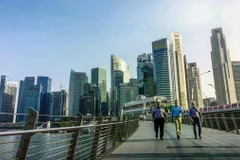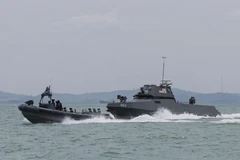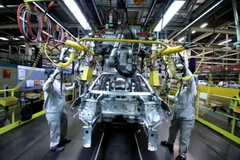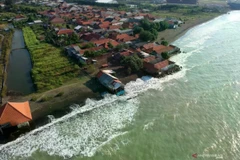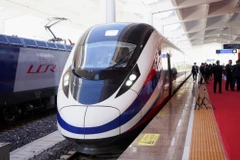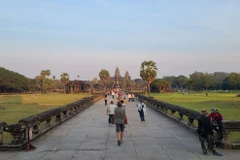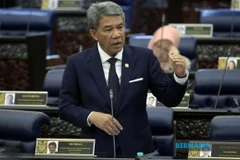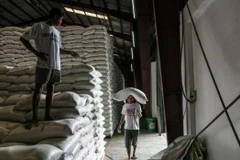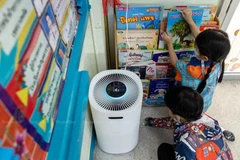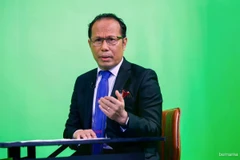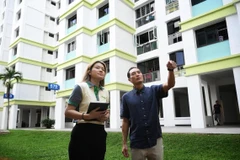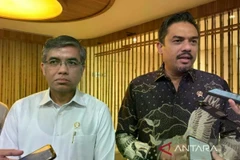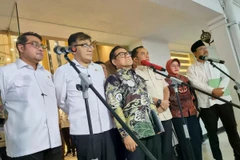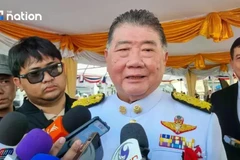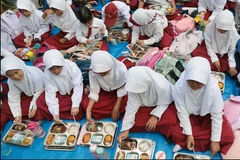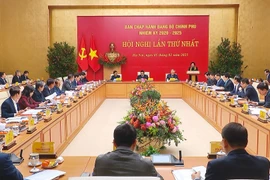 ASEAN Secretary-General Dato Lim Jock Hoi delivers a speech at the 3rd ASEAN Media Forum held in Bangkok on July 29. (Photos courtesy of ASEAN Secretariat)
ASEAN Secretary-General Dato Lim Jock Hoi delivers a speech at the 3rd ASEAN Media Forum held in Bangkok on July 29. (Photos courtesy of ASEAN Secretariat) Bangkok (VNS/VNA) - ASEAN Secretary-General Dato Lim Jock Hoi has expressedhis optimism over the likelihood that the Regional Comprehensive EconomicPartnership (RCEP) between 10 ASEAN member countries and six partners will befinalised by the end of the year.
RCEP isconsidered the world’s largest regional trade agreement as it covers a marketof almost half of the world’s population and around one third of global grossdomestic product.
There are27 rounds of RCEP negotiations over the past seven years but “we don’t want togo beyond that, if we don’t do it this year, it will be very difficult forus to go beyond next year,” Hoi said.
Accordingto the Secretary-General, political difficulties have already been resolved andunder the situation of trade tension among economic giants, there is urgencyfor all ASEAN members to push the agreement to its conclusion.
“We knowthat challenges are still there, and we will intensify negotiations among thetrade negotiators as well as at the ministerial level,” he said, affirming “theclimate seems to be quite positive.”
Economicministers are scheduled to meet in Thailand in September and “this will be avenue for the ministers to sit down and try to push [the negotiations] ahead.”
Whenasked about the most challenging problems that still exist, Hoi said: “Sixteencountries with different levels of economic development and different levels intrust. So it is not easy to put into one package. We need to balance theinterests of each country, which is the role of ASEAN.”
“We haveconcluded certain chapters in telecoms, the movement in IP, the movement infinancial services. But market access negotiations are still going and theywill not end until we are all satisfied.”
Somecountries are concerned that they would be exposed to many other imports, hesaid, adding that “They have to be careful and mindful with thedomestic pressure.”
However,“they have taken a practical approach toward RCEP. Hopefully they will lead theway to good outcomes in the months ahead,” Hoi said.
There isalso a problem with non-ASEAN members because they don’t have free tradeagreements (FTAs) among themselves so they need to intensify their negotiationsin market access, he added.
Speakingwith Vietnam News on the sidelines of the 3rd ASEAN MediaForum early this week, Dr Suthad Setboonsarng, Board Member of the Bank ofThailand, said that RCEP is a conglomeration of five FTAs. The first one is theASEAN-China FTA which was signed in 2003 and the toughest FTA is the one withIndia.
“In RCEPnegotiations, one of the rules is we have to give everybody else what we giveto one country,” like the Most Favoured Nations mechanism.
“What wehave to give to China, we must give to India and to Japan. In 2003’s agreement,China liberalises the agriculture sector for ASEAN countries. But now for Chinato liberalise the agriculture sector for Japan, India and Korea, it is muchmore difficult,” Setboonsarng said.
However,the former first Thai Deputy General-Secretary of ASEAN was also optimistic ofthe future of RCEP as he saw a new mechanism being implemented in negotiatingthe trade deal.
In thepast, there were trade negotiation working groups but heads of the groupscouldnot make any immediate decision at the meeting, he said.
“The onlyway to get RCEP is to come out for outside talks not on the table because goingto the table is very difficult.”
Currently, asmall group of three countries including Thailand (current ASEAN Chair),Singapore (last year’s ASEAN Chair) and Vietnam (next year’s ASEAN Chair) aregoing around other countries and try to talk and see what is the problem thateach country has, he said, adding that it will help facilitate the process.
“I thinkit has been used in political arena much more than in economic negotiations.But I saw this one, which is very important for the success of RCEP.”
Dr Hoe EeKhor, Chief Economist of ASEAN 3 Macro Economic Research Office, said if ASEANcountries and dialogue partners can finalise the RCEP, it will be a very strongsignal of commitment to rules-based multilateral trade amidst the rising trendof protectionism and nationalism.
Initiatedin 2012, RCEP involves 10 ASEAN member countries, namely Indonesia, Thailand,Malaysia, Singapore, Philippines, Myanmar, Vietnam, Cambodia, Laos and Brunei;and six dialogue partners including China, Japan, Australia, New Zealand, Indiaand the Republic of Korea.-VNS/VNA




